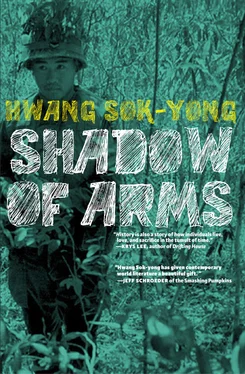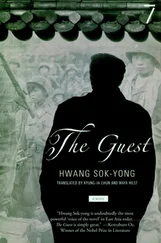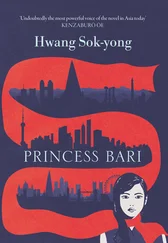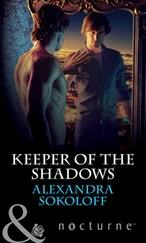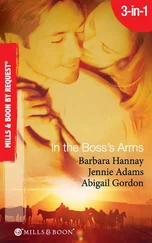Pham Minh was holding Shoan’s hands. His trembling fingers pressed into her sweat-soaked palms.
“Please don’t add my name to your altar.”
“Why not?”
“I’ll be back in person to see you.”
“No, Minh, you no longer have to come and see a man like me.”
“Don’t you approve of my choice?”
“My only wish is for you to win a victory, a clear victory,” Trinh mumbled.
Smoke curled from the pipe. The old man’s face and hands gradually merged into the deepening darkness behind him, leaving him nothing but a white figure. The room was filled with a smell of grass blended with the stench of burning opium.
“I’m selling gold now. I hid quite a bit up in the attic. My late father did the same before me. Every household had only two things, a Buddhist altar and gold. Nothing else was certain. But. . from this year on I’m selling it to buy and squander the most uncertain of things.”
“Opium, you mean?”
At those words from Pham Minh, the old man suddenly thundered, “Even on stormy days, time goes on!”
The three of them sat in silence. Bursts of gunfire rang out. In the intervals between the sounds of automatic weapons, helicopters could be heard. Night had fallen and with it returned the fighting and the repression.
“You two, my dears. .” whispered Uncle Trinh. “Go on out to the air raid shelter in the backyard. It’s a nice place to enjoy the fragrance of the flowers and to watch the stars.”
Uncle Trinh lied back down in the hammock. “Hurry, now, and go,” he urged as the hammock started to sway.
Shoan and Minh rose hand in hand. In the swinging hammock Uncle Trinh had fallen back into a deep sleep.
The climate was shifting into the dry season. Early in the morning a suffocating wind blew down from southern China and as the sun climbed into the sky the air became hot as hell. Everything came to a halt in the inferno. The “white sun,” as the infantrymen called it, was a furnace so fiery that after setting down your helmet for a minute you could fry an egg on it. All moisture was sucked from the air. Even the flies breathlessly searched for humid shade. There wasn’t a soul in sight, not in the battle zones, not in the streets.
Corporal Ahn Yong Kyu spent his last week of PX orientation at the US Marine commissaries. The first week had been the air force and the second the navy at China Beach. The detachment leader, Captain Kim, must have rated him competent. Yong Kyu was determined not to be an orderly for the remainder of his hitch, so every day he submitted his observations as scrupulously written reports.
“I was right — you’re quick. You’re the perfect replacement for Kang. See to it that you get into the market as early as possible.”
Pointer had said this to Yong Kyu after his first week of duty. However, he added one qualification to his praise.
“There’s one problem with your reports. Too many personal opinions. Of course, opinions from intelligence personnel are not entirely unnecessary. Very competent intelligence staff often make personal observations. But most important is honoring the duties required by headquarters. Only within those limits are personal opinions and views allowed.”
A hunting dog hunts only at his master’s command. But whether he runs straight or in a parabolic arc, runs too far and comes back to retrieve or pauses a few steps before, these choices are his. Whether the targeted prey happens to be a duck, a pheasant, a snipe, an old shoe, or even a deflated ball, he’s got to lock his teeth on it and bring it back to his master. It is not for the hunting dog to figure out whether the prey is delicious, useful, or inedible. That was the gist of the captain’s words. If Yong Kyu had not witnessed the carnage of a village destroyed, or that in a jungle swamp, he wouldn’t have understood Da Nang at all.
What is a PX? A Disneyland in a vast tin warehouse. A place where an exhausted soldier with a few bloodstained military dollars can buy and possess dreams mass-produced by industrial enterprises. The ducks and rabbits and fairies are replaced by machines and laughter and dances. The wrapping paper and the boxes smell of rich oil and are as beautiful as flowers.
What is a PX? A place where they sell the commodities used daily by a nation that possesses the skill to shower more than one million steel fragments over an area one mile wide by a quarter mile long with a single CBV. A nation capable of turning a three-hundred-acre tract of jungle into a defoliated wasteland where not a single plant or animal can survive, in under four minutes.
What is a PX? It’s Uncle Sam’s attic, the old man who makes appearances at villages the world over garbed in the Stars and Stripes, a Roman-style dagger in hand as he brandishes a shield with the motto: “America is the world’s largest and greatest nation.” It is the general store of the cavalry fort, frequented by whores and ministers and arms smugglers who join hands in transforming the natives into ridiculous puppets, intoxicating them and exploring new frontiers of vileness.
And the PX brings civilization to the filthy Asian slopeheads who otherwise would go on living in blissful ignorance on a diet of bananas and rice. It teaches them how to wash with Ivory soap, how to quench the thirst and ease the heart with the taste of Coke. It showers down upon the bombed-out barracks perfumes, rainbow-colored cookies and candy drops, lace-fringed lingerie, expensive wristwatches, and rings graced with precious stones. Cheese appears on the smelly meal tables of Asia, and condoms slip out from between Asian girls’ thighs and dance on children’s tiny fingertips.
Anyone who has ever been intoxicated, even once, by that taste and smell and touch, will carry the memory to his grave. The products ceaselessly create loyal consumers who are at the mercy of the producers. Those who lay hands upon the wealth of America will have the label US military burned into their brains. Children who grow up humming their songs and eating their candies and chocolates off the streets trust their benevolence and optimism. The vast purchasing power in the market, the booming business in the city, and the enthusiasm and ecstasy in the back alleys are all in proportion to the intensity of the war. The PX is a tempting wooden horse. And it is America’s most powerful new weapon.
Ahn Yong Kyu realized that, like the sentry posts dotting the jungle, each PX was a place of protection that aroused hostility all around itself. Was this war actually a rebellion? Or had it long since passed beyond that stage? In an investigation report concerning an infantry soldier who had caught a Vietnamese child stealing a hand grenade, it was written that the child answered the soldier, “I stole it to protect myself.”
To keep the child from protecting himself any longer, the infantryman shot him. Only those in uniform were on his side. No uniform meant an enemy.
“The Americans are so naive,” muttered the detachment leader, Captain Kim, as he looked over the American CID report.
“Have you seen this?”
“Yes, I’ve looked through, sir.”
“Make a memo on it.”
Yong Kyu had come into the office to write up some paperwork. The judge advocate’s cars coming in and out told him there must be a court martial in progress. He heard it had to do with the death of some Vietnamese girl. Anyone coming out of the jungle would consider the case a joke.
Due to their nature such cases, from the standpoint of operational priorities, could not be tried as official cases. It was the kind of thing that happened every day on a large scale but was soon forgotten in the course of reconnaissance patrols and ambushes. Captured regular army soldiers with serial numbers would go through screening and be treated as prisoners. But even that procedure only applied on large-scale operations. On the company level there was no manpower to stop the savage behavior of infantrymen facing their own deaths, and for that same reason keeping prisoners of war was out of the question.
Читать дальше
